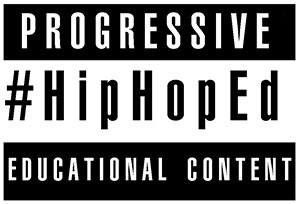
Hip Hop is making waves in US Science classrooms, as #HipHopEd applies the cultural movement as a medium for education.
#HipHopEd is an educational movement spearheaded by Dr Chris Emdin, associate professor in the department of Mathematics, Science and Technology at Teachers College, Columbia University, and Hip Hop archive fellow at Harvard University's WEB DuBois Institute.
The movement uses a broad range of methodologies to bring Hip Hop into the classroom, including building basic recording studios to teach students sound engineering and recording skills, as well as coding for sharing their music online.
#HipHopEd has reaped not only enthusiastic engagement from students, but recognition and participation from renowned Hip Hop artists.
In 2013, #HipHopEd's Science Genius project saw Hip Hop group Wu-Tang Clan's GZA partner with Emdin and popular lyrics Web site RapGenius.com in challenging high school students to write Science-focused rhymes, the best of which, selected by GZA, appeared on the Web site alongside students' favourite hits.
In June, Grammy-winning Hip Hop artist Kendrick Lamar visited a high school incorporating his lyrics into its English classes, where he listened to students perform and engaged in discussion with them about his work, as well as performing himself.
Emdin hails Hip Hop as a fantastic tool for ingesting and retaining vast quantities of information. "Give a young person a Hip Hop album and they'll have memorised the lyrics by the end of the day. Give a young person a textbook and they'll be asleep after the first chapter," he says.
Hip Hop is simply more fun and engaging than traditional methods of Science teaching such as textbooks, Emdin adds.
STEM needs STEAM
In teaching STEM subjects (Science, Technology, Engineering and Mathematics), Emdin advocates an interdisciplinary approach known as STEAM: Science, Technology, Engineering, Arts and Mathematics. STEAM deconstructs the mythology that STEM subjects must be compartmentalised according to specific ways of thinking, Emdin explains.
Fostering scientific thinking and skills alone can train brilliant scientists, but it does not equip them for innovation, he continues. Bringing creative disciplines into STEM teaching not only creates new pathways to understanding and engagement, but fosters the presence of creative thinking in STEM disciplines that is needed to forge new ideas and inventions, he says.
Cultural relevance
Bringing cultural mediums such as Hip Hop's music and poetry into the classroom can also bridge the yawning cultural divide many marginalised students experience when learning sciences, Emdin continues.

"We have to begin with the recognition that science is not acultural," he puts forward, explaining that however culturally neutral Science's objects of study may be, its methods of pedagogy are historically developed and aligned according to the norms and perspectives of a specific population. "Science is very Eurocentric," and this leaves many students feeling excluded, he says.
Furthermore, female STEM students and STEM students of colour are often discouraged and marginalised by the representation of predominantly white, male role models and gatekeepers within STEM fields, which in turn perpetuates cultural and gender bias in these disciplines, he notes.
Hip Hop is particularly instrumental in engaging marginalised students because it is historically and continually developed around the voices of marginalised groups, and offers a message of acceptance to those who feel shut out by oppressive systems, Emdin explains. "There are no politics of respectability in Hip Hop, and very strong politics of respectability in Science and academia," he says.
Yet Hip Hop itself faces harsh stigmatisation, specifically as anti-intellectual, Emdin reflects. Part of #HipHopEd's mission is to forge intellectual identities within Hip Hop, identifying and exemplifying the academic potential of Hip Hop and constructing intellectual spaces marginalised groups can claim as their own, Emdin explains.
#HipHopEd has started its own record label, to which three artists are signed to date, says Emdin. The movement hosts Twitter conversations under the #HipHopEd hashtag every Tuesday from 9-10pm EST.
Dr Chris Emdin will be speaking at the Inspired Teachers Conference in Johannesburg on 18 August.
Share